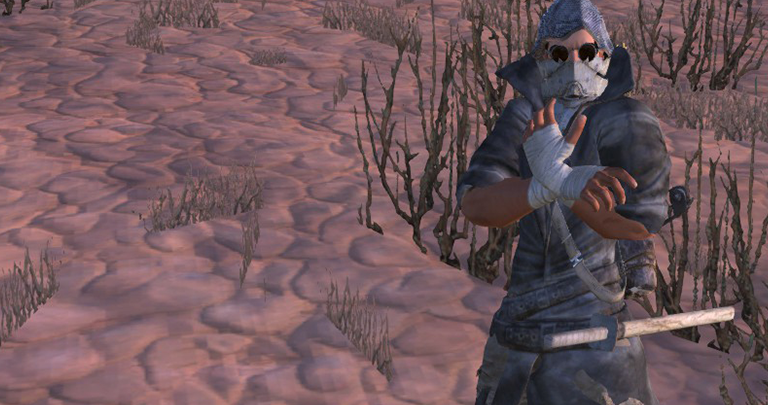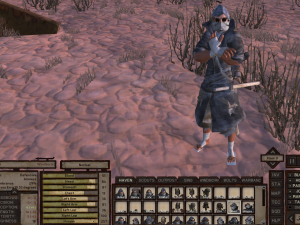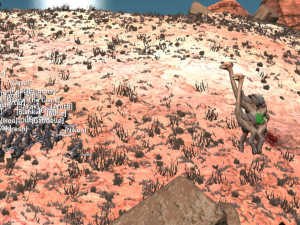
We’re back, which means I’m back on my bullshit, and the game that I’ve been playing a lot is Kenshi. Kenshi is a real-time strategy role-playing game by Lo-Fi Games, and challenges players to make their own fun in a hard and uncaring world. Billed as part of a genre of super difficult games that trade in a main story for a large world and emergent narrative, it invites the player to recruit a faction and establish a presence in the world. It has open-ended settlement building, complex diplomacy, and the chance to pick a fight with everything from bandits to raptors to huge robot spiders using weapons like swords.
As games go, most of that sounds pretty standard. Unforgiving landscapes, ancient technology, robot cannibals, forty shades of brown, you’ve seen it all before and so have I. What sparked my interest was the first time I encountered a group of bandits, who beat me into unconsciousness, took my food, and left me in the wasteland. But I was still alive. In fact, after I’d limped back to a settlement and bandaged my wounds, I was stronger. My strength, toughness, and attack and defense skills had gone up. When I understood that that was the premise of the game, I was hooked.
Getting tough means taking your licks

A large challenge of game design is making a game that’s fun while you’re losing. In Kenshi, losing fights and failing checks makes you better at them. Characters learn and improve at the things they try, which means the most important thing to do is try. Trying things is largely the only means of advancement, and failing at them is often the only way to improve. The only way your Toughness increases is by taking a beating, for example.
At every turn, Kenshi gives you the opportunity to decide how to get your ass kicked. Design and build your own settlements where you like, set up groups and squads the way you want them, and equip them as you see fit. Use stealth, treachery, warfare, trade, and exploration to accomplish your goal, and choose what your goals and timeline are on your own. It’s a big world, and most everything in it is willing to hand you your ass in one way or another.
Experience is equity
One of the immediate consequences of this is that what’s valuable in Kenshi is the education you’ve received.When several scouts were accosted by beaked horrors in the wilderness, I found myself sending medics out to rescue them, running for a day to collect them. From then on, my squads moved close together, to provide support to one and other, so it was easy to mount a rescue when one of our warband was captured by cannibals. People are valuable for what they know and what they can do, and anyone can learn to do anything with enough practice. Sometimes that means throwing away gear and valuable loot to preserve the life of a character, and deaths are recognizable as a failure to support them fully.
This gives the player a chance to develop a relationship with each character, as they improve their skills based on your instructions and the events around them. This goes for combat skills, but also exploration, research, and labour skills. My faction, the Windborn, has a dedicated warband now, but I also have crafters, roboticists, medics, farmers, and cooks. The job system offers a simple way to layer priorities and ensure that characters aren’t idle, and maintain operations around a settlement. A faction runs on food, so losing a good cook can be worse than losing a good archer.
Chasing challenges

By making failure a useful outcome, Kenshi teaches players not to fear failing. Once you realize that, it’s straightforward to chase challenges relentlessly. Hunt bandits and raiders for bounties, defeat legendary creatures, make war on slavers, or build a trading empire. Do all of them at once, or pivot as needed. There are always opportunities to grow, to expand your faction, and there’s a huge world to explore. With no main story, Kenshi offers to let you create your own narrative, build where you like, and build your own relationship with the factions and nations in the world. I’ve been learning a lot about engagement planning, project management, and how to answer basic leadership questions like “Does a person have enough support to accomplish the task they’ve been set?” and “What jobs can I give people to help them improve?”
As a person fixated on perfection in games like 바카라, it’s been delightful to accept messiness and failure as part of the game, rather than as an end to it. Trying new things and constantly revising my strategies and goals has done a lot to change the way I engage with games, and provided some tools for tackling challenges in real life, too.
If you want to get into Kenshi, it’s available on Steam, and I recommend Tobel Plays tutorials on it. The initial learning curve can be a bit steep, and Tobel does a good job of teaching the ins and outs of the early game. If you want to see us play games, we’re live at twitch.tv/wootsuitriot every Tuesday and Sunday night.




